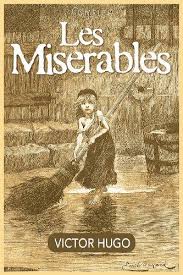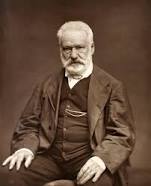Les Misérables Page #31
Les Misérables is a French historical novel by Victor Hugo, first published in 1862, that is considered one of the greatest novels of the 19th century. In the English-speaking world, the novel is usually referred to by its original French title.
The flash passed, the night closed in again; and where was he? He no longer knew. The peculiarity of pains of this nature, in which that which is pitiless--that is to say, that which is brutalizing--predominates, is to transform a man, little by little, by a sort of stupid transfiguration, into a wild beast; sometimes into a ferocious beast. Jean Valjean's successive and obstinate attempts at escape would alone suffice to prove this strange working of the law upon the human soul. Jean Valjean would have renewed these attempts, utterly useless and foolish as they were, as often as the opportunity had presented itself, without reflecting for an instant on the result, nor on the experiences which he had already gone through. He escaped impetuously, like the wolf who finds his cage open. Instinct said to him, "Flee!" Reason would have said, "Remain!" But in the presence of so violent a temptation, reason vanished; nothing remained but instinct. The beast alone acted. When he was recaptured, the fresh severities inflicted on him only served to render him still more wild. One detail, which we must not omit, is that he possessed a physical strength which was not approached by a single one of the denizens of the galleys. At work, at paying out a cable or winding up a capstan, Jean Valjean was worth four men. He sometimes lifted and sustained enormous weights on his back; and when the occasion demanded it, he replaced that implement which is called a jack-screw, and was formerly called orgueil [pride], whence, we may remark in passing, is derived the name of the Rue Montorgueil, near the Halles [Fishmarket] in Paris. His comrades had nicknamed him Jean the Jack-screw. Once, when they were repairing the balcony of the town-hall at Toulon, one of those admirable caryatids of Puget, which support the balcony, became loosened, and was on the point of falling. Jean Valjean, who was present, supported the caryatid with his shoulder, and gave the workmen time to arrive. His suppleness even exceeded his strength. Certain convicts who were forever dreaming of escape, ended by making a veritable science of force and skill combined. It is the science of muscles. An entire system of mysterious statics is daily practised by prisoners, men who are forever envious of the flies and birds. To climb a vertical surface, and to find points of support where hardly a projection was visible, was play to Jean Valjean. An angle of the wall being given, with the tension of his back and legs, with his elbows and his heels fitted into the unevenness of the stone, he raised himself as if by magic to the third story. He sometimes mounted thus even to the roof of the galley prison. He spoke but little. He laughed not at all. An excessive emotion was required to wring from him, once or twice a year, that lugubrious laugh of the convict, which is like the echo of the laugh of a demon. To all appearance, he seemed to be occupied in the constant contemplation of something terrible. He was absorbed, in fact. Athwart the unhealthy perceptions of an incomplete nature and a crushed intelligence, he was confusedly conscious that some monstrous thing was resting on him. In that obscure and wan shadow within which he crawled, each time that he turned his neck and essayed to raise his glance, he perceived with terror, mingled with rage, a sort of frightful accumulation of things, collecting and mounting above him, beyond the range of his vision,--laws, prejudices, men, and deeds,--whose outlines escaped him, whose mass terrified him, and which was nothing else than that prodigious pyramid which we call civilization. He distinguished, here and there in that swarming and formless mass, now near him, now afar off and on inaccessible table-lands, some group, some detail, vividly illuminated; here the galley-sergeant and his cudgel; there the gendarme and his sword; yonder the mitred archbishop; away at the top, like a sort of sun, the Emperor, crowned and dazzling. It seemed to him that these distant splendors, far from dissipating his night, rendered it more funereal and more black. All this--laws, prejudices, deeds, men, things--went and came above him, over his head, in accordance with the complicated and mysterious movement which God imparts to civilization, walking over him and crushing him with I know not what peacefulness in its cruelty and inexorability in its indifference. Souls which have fallen to the bottom of all possible misfortune, unhappy men lost in the lowest of those limbos at which no one any longer looks, the reproved of the law, feel the whole weight of this human society, so formidable for him who is without, so frightful for him who is beneath, resting upon their heads. In this situation Jean Valjean meditated; and what could be the nature of his meditation? If the grain of millet beneath the millstone had thoughts, it would, doubtless, think that same thing which Jean Valjean thought. All these things, realities full of spectres, phantasmagories full of realities, had eventually created for him a sort of interior state which is almost indescribable. At times, amid his convict toil, he paused. He fell to thinking. His reason, at one and the same time riper and more troubled than of yore, rose in revolt. Everything which had happened to him seemed to him absurd; everything that surrounded him seemed to him impossible. He said to himself, "It is a dream." He gazed at the galley-sergeant standing a few paces from him; the galley-sergeant seemed a phantom to him. All of a sudden the phantom dealt him a blow with his cudgel.
Translation
Translate and read this book in other languages:
Select another language:
- - Select -
- 简体中文 (Chinese - Simplified)
- 繁體中文 (Chinese - Traditional)
- Español (Spanish)
- Esperanto (Esperanto)
- 日本語 (Japanese)
- Português (Portuguese)
- Deutsch (German)
- العربية (Arabic)
- Français (French)
- Русский (Russian)
- ಕನ್ನಡ (Kannada)
- 한국어 (Korean)
- עברית (Hebrew)
- Gaeilge (Irish)
- Українська (Ukrainian)
- اردو (Urdu)
- Magyar (Hungarian)
- मानक हिन्दी (Hindi)
- Indonesia (Indonesian)
- Italiano (Italian)
- தமிழ் (Tamil)
- Türkçe (Turkish)
- తెలుగు (Telugu)
- ภาษาไทย (Thai)
- Tiếng Việt (Vietnamese)
- Čeština (Czech)
- Polski (Polish)
- Bahasa Indonesia (Indonesian)
- Românește (Romanian)
- Nederlands (Dutch)
- Ελληνικά (Greek)
- Latinum (Latin)
- Svenska (Swedish)
- Dansk (Danish)
- Suomi (Finnish)
- فارسی (Persian)
- ייִדיש (Yiddish)
- հայերեն (Armenian)
- Norsk (Norwegian)
- English (English)
Citation
Use the citation below to add this book to your bibliography:
Style:MLAChicagoAPA
"Les Misérables Books." Literature.com. STANDS4 LLC, 2025. Web. 9 Feb. 2025. <https://www.literature.com/book/les_mis%C3%A9rables_13>.








Discuss this Les Misérables book with the community:
Report Comment
We're doing our best to make sure our content is useful, accurate and safe.
If by any chance you spot an inappropriate comment while navigating through our website please use this form to let us know, and we'll take care of it shortly.
Attachment
You need to be logged in to favorite.
Log In